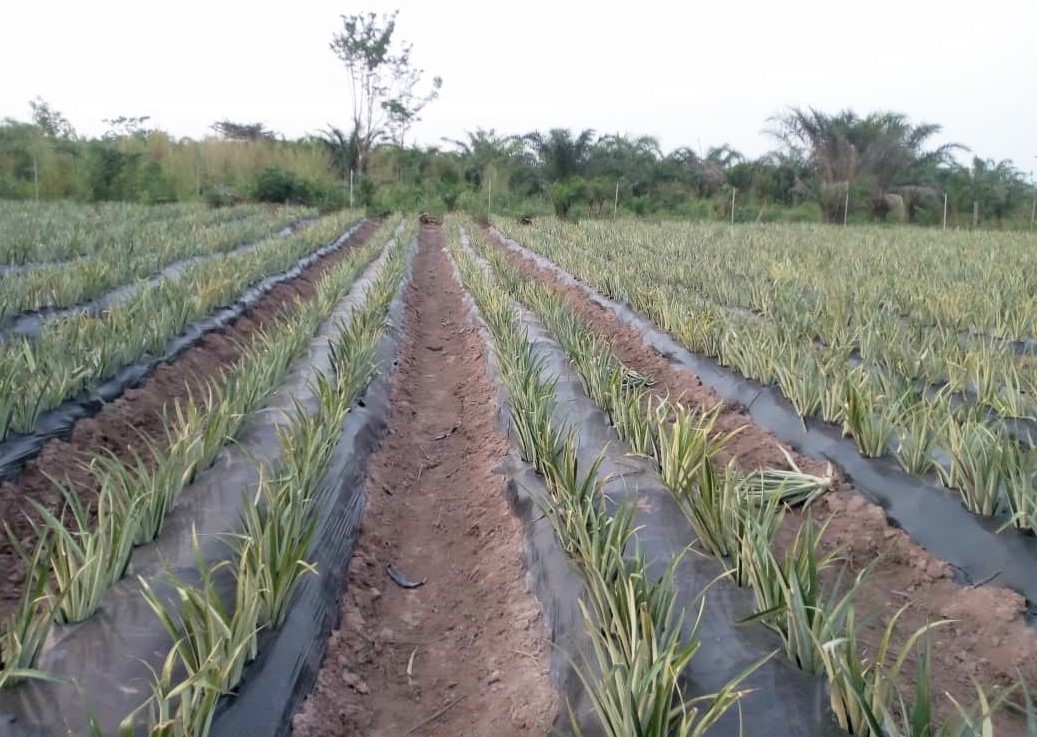He looks quite reserved yet is outspoken, but ‘softly’. He sat overlooking the direction of a group of locals walking toward the isolated private compound-house where the two tricycles had been readied for the morning’s departure to the farm, which is about 15 minutes-ride from our location; and while gazing at the morning skies said, “this weather is without rain today”.
I nodded impulsively. In my mind’s eye, this is something he has done for well over the three decades of his life, so how could I doubt his ‘weather forecasting’ capability. What had baffled me, though, was who he tells me he was and his ambition to empower the townsfolks through employment creation, in our prior chat. The only mountains now standing between him and his quest, he indicated, is the help he requires to join the export market and being able to process some of his produce.
Farming, for ages, has widely been considered in our society – and perhaps the entire African continent – a profession for the aged, uneducated and poor. This explains why despite the abundance of arable land in Ghana, the country still heavily relies on the importation of food, including poultry products, for local consumption. In fact, it has now become the pursuit of successive governments to introduce incentives which encourage budding youth to enter into farming, especially also at the backdrop of the worrying statistics on the age of an average Ghanaian farmer.
But some youths want to change the narrative. One of them is Francis Sanusi, affectionately nicked-named Chief Bamidele Sanusi by friends – a Cambridge-trained teacher of French and Literature in English, at the IGCSE and ‘A’ level, who is currently pursuing a postgraduate programme in Development Communication at the Ghana Institute of Journalism (GIJ), and is into farming. He owns the Frank-Gladys Fruit Farms, a 60 acre-plot of pineapple farm at Kpando in the Volta Region.

Farming, on the contrary, he said, is a very lucrative business, though money is not his motivation. For Sanusi, despite all the perceived prevailing challenges that discourage young people from going into farming, there is more to earn than to lose when one chooses farming over other options.
He began his own journey as an independent farmer in 2004 with maize and cassava farming. And by dint of hard work and determination, he ventured into pineapple farming on an acre of land in 2008, which has now expanded into 60-acre pineapple farm. In 2016, Francis was recognised as the ‘Best Pineapple Farmer’ for the Kpando Municipality in the Volta Region, at the 32nd National Farmers’ Day celebration organised by the Ministry of Food and Agriculture.
On average, he said, Frank-Gladys Fruit Farms, which has a total workforce of 30 farmhands – half of whom are permanent workers – is able to reap about 20,000 pieces of pineapple from an acre of their farmland, which is about 27.6 tonnes, of the three main varieties of pineapple, cultivated – MD2, Sugar Loaf and Smooth Cayenne – making pineapple farming quite a ‘fruitful venture’.
Although he has the vision to increase the acreage of his farm, and by so doing provide more employment opportunities for people within his locality, Francis disclosed that they are faced with several challenges, including post-harvest losses and access to a stable market to buy this highly perishable produce all year round.
While lack of access to a reliable local market has been a disincentive, he noted, the chance to supply some few identified local vendors is often complicated by the cost of transportation and lack of proper handling of the fruits from the farm to the market by transport operators, which causes a chunk of the fruit to spoil by the time they reach the market.
At the moment, the alternative solution, he says, is to fall back on his ambition to go into processing either through some partnership arrangement or access to an affordable credit facility to set up a processing factory of his own. This, he said, will complement the government’s industrialisation agenda while also creating more opportunities for other businesses in the value-chain, as well as offering employment opportunities to many of the unemployed youth in the area.
He as well seeks an opportunity to gain entry into the export market to enable him to export some of the unprocessed fruit abroad.
In fact, the plight of Francis has now been worsened by the outbreak of COVID-19, just like many businesses across the country. This notwithstanding, Frank-Gladys Fruit Farms has commendably kept all permanent employees and refused to activate any ‘furlough scheme’ or lay them off at the back of huge revenue decline, coupled with impacts of the COVID-19 pandemic.
Despite calls on the youth to move into farming and the efforts of this young man which provide a number of people an opportunity to be able to feed their families, he revealed that as a pineapple farmer the only support he receives is the occasional assistance of local extension officers he engages. Beyond that, he is unable to access any of the incentives introduced by the government through the Agric Ministry – with the reason that pineapples do not fall among the cash-crops captured under government’s flagship agriculture programme, Planting for Food and Jobs (PJF). He wants the government to step up efforts in supporting young entrepreneurs who go into agriculture.
But as the support is still being looked forward to, Sanusi’s advice to the youth is not to allow the negative perceptions and challenges in agriculture discourage them from moving into the sector. He wants the youth to understand that agriculture is not all about going to the farm to weed; they can look at agribusiness and agritourism as well. All that is required, he says, is to have the interest and work toward it.
Contact: 0249451276










